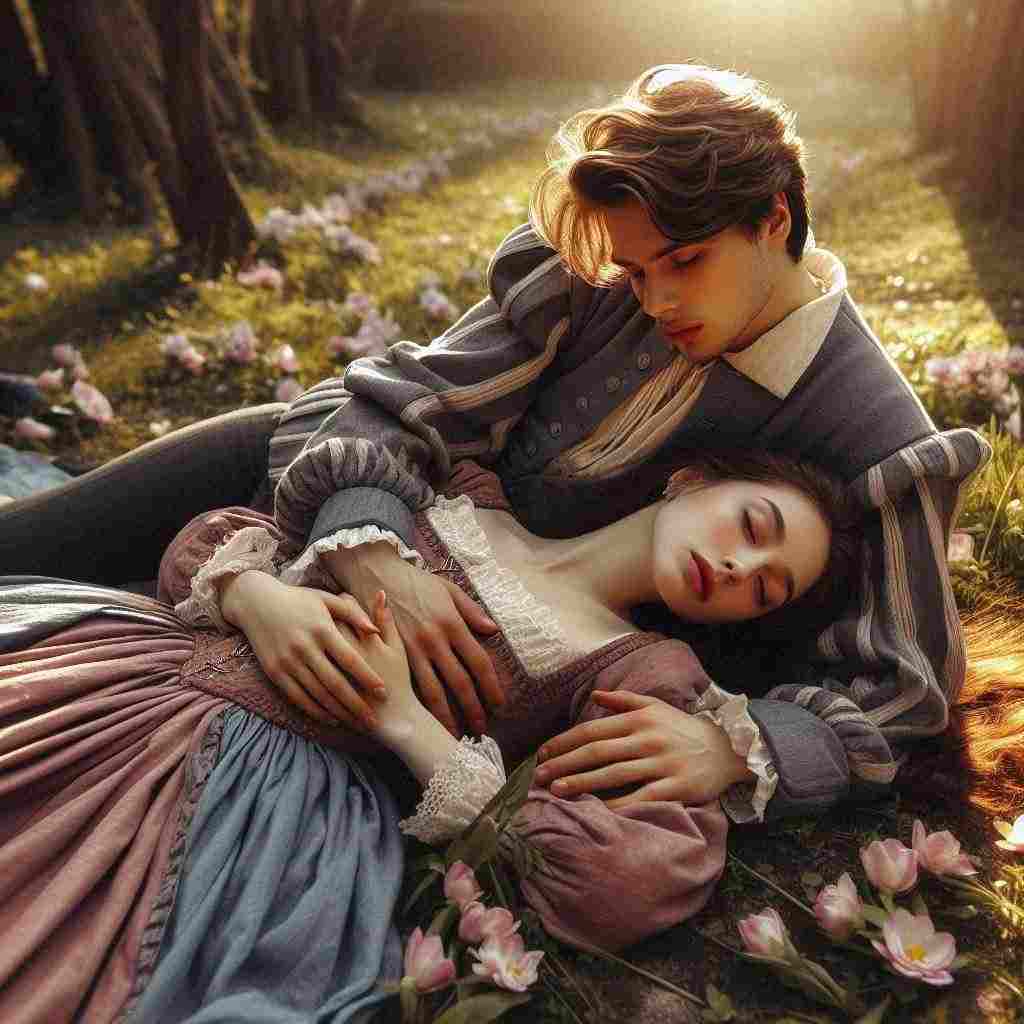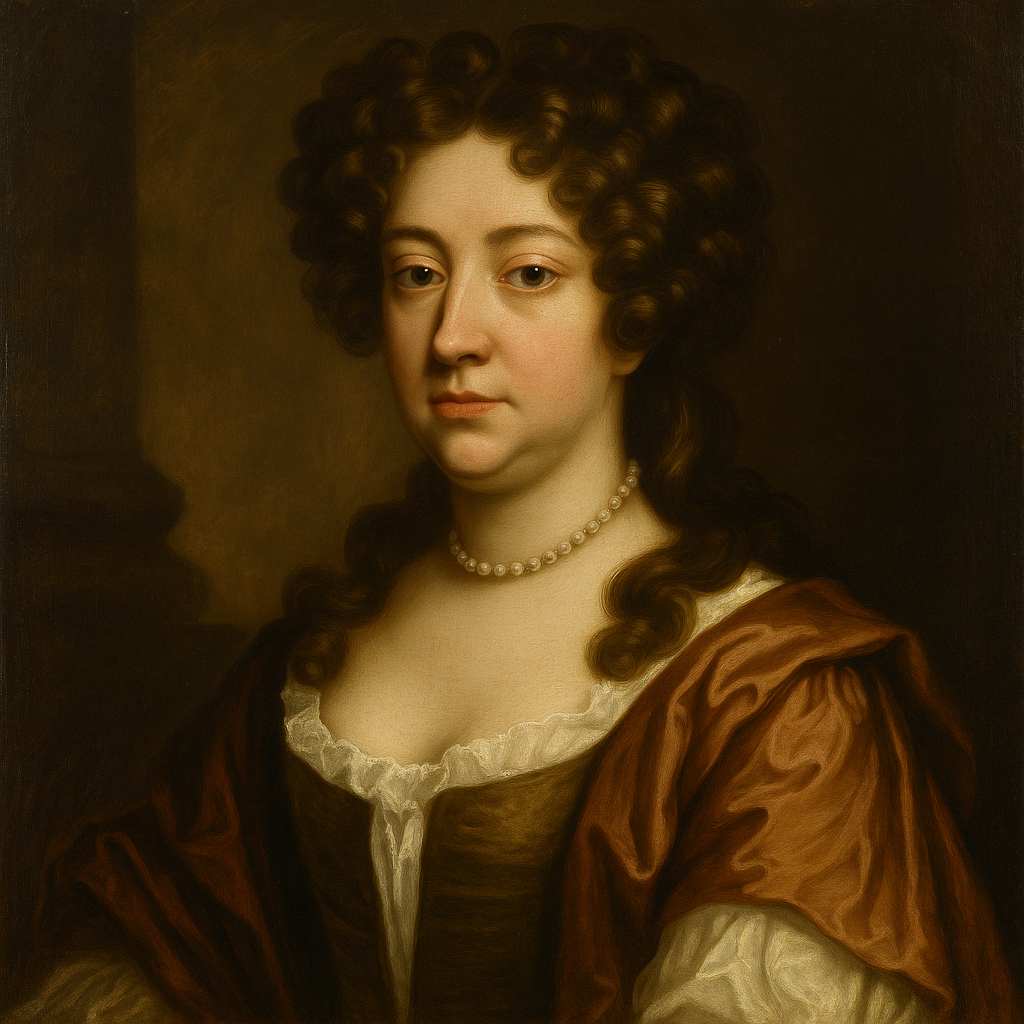The Willing Mistriss
Aphra Behn
1640 to 1689

Amyntas led me to a Grove,
Where all the Trees did shade us;
The Sun it self, though it had Strove,
It could not have betray’d us:
The place secur’d from humane Eyes,
No other fear allows.
But when the Winds that gently rise,
Doe Kiss the yielding Boughs.
Down there we satt upon the Moss,
And id begin to play
A Thousand Amorous Tricks, to pass
The heat of all the day.
A many Kisses he did give:
And I return’d the same
Which made me willing to receive
That which I dare not name.
His Charming Eyes no Aid requir’d
To tell their softning Tale;
On her that was already fir’d
’Twas easy to prevaile.
He did but Kiss and Clasp me round,
Whilst those his thoughts Exprest:
And lay’d me gently on the Ground;
Ah who can guess the rest?
Aphra Behn's The Willing Mistriss
Aphra Behn’s poem "The Willing Mistriss," written during the Restoration era, presents a vivid depiction of female desire, agency, and autonomy within the context of a seemingly pastoral and idyllic setting. As one of the first professional female writers in English literature, Behn occupies a unique position within the literary canon, often exploring themes that challenge the dominant ideologies of her time. "The Willing Mistriss" can be interpreted as a subversive piece that reclaims female sexual autonomy and disrupts traditional patriarchal narratives by foregrounding the female speaker’s active participation in her own seduction.
Context and Background
Aphra Behn, writing in the late 17th century, was navigating a period marked by significant social and political upheaval. The Restoration of Charles II to the throne in 1660 saw a resurgence of the arts, including a flourishing of literary and theatrical works that often revelled in themes of sexuality, libertinism, and the questioning of moral absolutes. Within this milieu, Behn’s work is particularly striking for its candid exploration of female sexuality, a subject often muted or obscured in the writings of her male contemporaries.
Behn’s career as a playwright, poet, and novelist was characterised by her willingness to transgress societal boundaries, and "The Willing Mistriss" is emblematic of this spirit. The poem’s pastoral setting, with its associations of innocence, simplicity, and a return to nature, serves as a backdrop for a narrative that is anything but innocent in its exploration of sexual desire.
The Role of the Pastoral Setting
The poem begins with the speaker being led by Amyntas, a traditional pastoral figure, to a secluded grove: "Amyntas led me to a Grove, / Where all the Trees did shade us; / The Sun it self, though it had Strove, / It could not have betray’d us." The grove, with its protective shade and exclusion of the sun, symbolises a space removed from the prying eyes of society—a private Eden where the natural world colludes in the lovers’ tryst. The imagery of the grove as a site of concealment is significant, as it frames the ensuing events within a context of both secrecy and safety, where societal norms and expectations are momentarily suspended.
This pastoral setting, however, is not merely a passive backdrop but an active participant in the poem’s narrative. The gentle winds that "Kiss the yielding Boughs" echo the tender interactions between the lovers, suggesting a harmony between human and natural desires. The use of natural imagery to parallel human behaviour is a common trope in pastoral poetry, but Behn employs it here to subversive effect. By aligning the natural world with the lovers’ actions, Behn legitimises the expression of female sexual desire, portraying it as an innate and unshameful part of human experience.
Female Desire and Agency
Central to the poem is the depiction of the female speaker’s desire and her active role in the seduction. The speaker’s willingness to participate in the amorous encounter is unambiguously stated: "A many Kisses he did give: / And I return’d the same / Which made me willing to receive / That which I dare not name." The reciprocity of kisses highlights the mutuality of the exchange, challenging the traditional portrayal of women as passive recipients of male desire. The phrase "willing to receive" further underscores the speaker’s agency, as she consciously and consensually engages in the sexual act.
The line "That which I dare not name" introduces an element of coyness, but it is a deliberate rhetorical strategy rather than a sign of shame. By refusing to name the sexual act explicitly, the speaker maintains control over her narrative, withholding full disclosure from the reader and thus retaining a sense of personal privacy and power. This evasion also serves to heighten the erotic tension of the poem, drawing attention to the speaker’s awareness of social taboos while simultaneously flouting them.
Subversion of Traditional Gender Roles
"The Willing Mistriss" subverts traditional gender roles by presenting a female subject who is not only sexually autonomous but also dominant in her own narrative. The speaker’s description of Amyntas’s "Charming Eyes" and his actions—"He did but Kiss and Clasp me round"—are conveyed with an air of inevitability, yet it is the speaker who ultimately controls the progression of events. The poem culminates in the speaker being "lay’d gently on the Ground," a moment that is both tender and charged with sexual implication. The rhetorical question that follows—"Ah who can guess the rest?"—serves as an open invitation for the reader to imagine the conclusion, while also affirming the speaker’s complicity and satisfaction in the encounter.
Behn’s portrayal of the speaker’s willing participation and pleasure challenges the patriarchal construction of women as passive objects of male desire. The poem refuses to moralise or condemn the speaker’s actions, instead presenting them as natural and consensual. In doing so, Behn undermines the dominant cultural narratives that sought to regulate female sexuality, offering instead a vision of sexual freedom and empowerment.
Ambiguity and Interpretation
While "The Willing Mistriss" can be read as a celebration of female sexual autonomy, it also invites more ambiguous interpretations. The speaker’s use of the phrase "That which I dare not name" could be seen as an indication of internalised societal shame, suggesting that the speaker’s willingness may be tempered by a fear of judgement. Moreover, the pastoral setting, often idealised as a space of innocence, might be interpreted as a deceptive facade that masks the complexities and potential dangers of sexual desire.
The poem’s ambiguous tone is further complicated by its ending, where the speaker’s rhetorical question leaves the narrative unresolved. By refusing to provide a definitive conclusion, Behn leaves the reader to grapple with the implications of the encounter. Is the speaker’s willingness a true expression of autonomy, or is it shaped by the pressures and expectations of a patriarchal society? Behn’s use of ambiguity allows for multiple readings, each reflecting different aspects of the complex relationship between desire, power, and societal norms.
Conclusion
Aphra Behn’s "The Willing Mistriss" is a richly layered poem that engages with themes of desire, agency, and the subversion of patriarchal norms. Through her depiction of a female speaker who is both sexually autonomous and narratively dominant, Behn challenges the traditional roles assigned to women in literature and society. The poem’s pastoral setting serves not only as a backdrop for the lovers’ tryst but also as a symbolic space where natural and human desires converge, legitimising the expression of female sexuality.
Yet, the poem’s ambiguity and open-endedness invite a range of interpretations, reflecting the complexities of sexual desire and the societal forces that shape it. In "The Willing Mistriss," Behn offers a vision of sexual freedom that is both empowering and nuanced, making it a powerful and subversive work within the context of 17th-century literature. Through this poem, Behn asserts the legitimacy of female desire and the right of women to narrate their own experiences, challenging the reader to reconsider the boundaries of propriety and the nature of consent.
This text was generated by AI and is for reference only. Learn more
Want to join the discussion? Reopen or create a unique username to comment. No personal details required!



Comments
No comments yet. Be the first to comment!